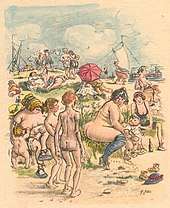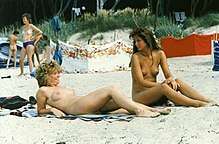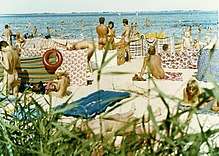Freikörperkultur
Freikörperkultur (FKK) is a German movement whose name translates to free body culture. It endorses a naturistic approach to sports and community living. Behind that is the joy of the experience of nature or also of being nude itself, without direct relationship to sexuality. The followers of this culture are called traditional naturists, FKK'ler, or nudists. The German nudist movement was the first worldwide and marked the start of an increased acceptance of public nudity in Germany.[1] Today, there are only few legal restrictions on public nudity in Germany.
History
_-_1897_-_Freilicht_-_vmp_01.jpg)
Beginnings in the 18th century
In many parts of central Europe up until the 18th century, people bathed naked in rivers and lakes, although often separately by sex. Beginning in the late 18th century, public nudity became increasingly taboo. At the same time, Lord Monboddo (1714–1779) practised and preached nude bathing as a revival of Ancient Greek attitudes toward nudity.[2]
"Nude culture" and life reforms – up to World War I
In 1898 the first Freikörperkultur club was founded in Essen. In 1900 more and more Swedish baths[lower-alpha 1] arose in rooms in Berlin and on the North and Baltic Seas and a naturist movement began in France.
The FKK movement was based on an attitude towards life where the naked body is not a source of shame. Freikörperkultur does not involve sexuality. Nakedness in the shower or sauna is not Freikörperkultur, since it is practically necessary. Nudity has to have prior group consent, and therefore requires no reserved zones, such as separate beaches or club areas.
With political liberalization, conservative circles challenged the nude baths which had become popular among urban intellectuals, seeing them as a corruption of morality.
Naturism between World War I and World War II

The first nude beach in Germany was established in 1920 on the island of Sylt. In 1933 after the Nazi Party came to power, nudist organizations were banned or integrated into Nazi organizations. The first dissertation about the FKK movement was written in the 1930s. The first naturist Olympic Games took place in Thielle in Switzerland in August 1939.
One of the greatest dangers for German culture and morality is the so-called nudity movement. Greatly as it is to be welcomed in the interest of the public health, that ever wider circles, especially of the metropolitan population, are striving to make the healing power of sun and air and water serviceable to their body, as greatly must the so-called nudity movement be disapproved of as a cultural error. Among women the nudity kills natural modesty; it takes from men their respect for women, and thereby destroys the prerequisite for any genuine culture. It is therefore expected of all police authorities that, in support of the spiritual powers developed through the national movement, they take all police measures to destroy the so-called nude culture. Hermann Göring, 1933 Nazi edict
The 'Kampfring für völkische Freikörperkultur', established in May 1933,[4] was a pro-Nazi völkisch umbrella body for German Freikörperkultur nudist groups, which excluded Jews and most communist nudist groups. Some sources state that Himmler and the SS supported Naturism.[5] In Germany the ban against nude swimming was softened by allowing nude swimming in remote areas in 1942.
From 1945 to present


In 1949, the Deutscher Verband für Freikörperkultur (DFK) (German Association for Free Body Culture) was founded, which today is a member of the German Olympic Sport Federation (DOSB) and the largest member of the International Naturist Federation (INF).
The first naturist holiday resorts were opened around 1950 in France (Centre-Hélio-Marin in Montalivet-les-Bains, Aquitaine, France).
The nude beach in Kampen on the island of Sylt in Germany was particularly popular due to extensive media coverage. FKK resorts in Yugoslavia, France and on the Baltic Seacoast became popular holiday places. Naturist organizations gained many new members in the 1960s.[6]
Social nudism and FKK-inspired naturism was particularly popular in East Germany, possibly because of a more secular cultural development.[7]
In the later decades of the 20th century, naturism became very popular outside Germany. Beach culture was often intermixed – nude and dressed people would swim together and nudity was widely tolerated.
One popular form of Freikörperkultur is Nacktwanderung, literally translated as Naked hike, where a walking group will collectively hike through the open countryside,[8] which is possible in Germany due to the liberal laws on non-sexual public nudity. This attitude does extend to Austria, where FKK culture enjoys a high degree of public acceptance,[9] but not to the German-speaking regions of Switzerland.[8]
Switzerland
In response to an influx of German FKK enthusiasts crossing the Alps, the Swiss canton of Appenzell Innerrhoden, which became a popular destination for naked hiking, created laws making nude hiking illegal in 2009.[10] Local regulatory authorities punished public nudity with fines, which many naked ramblers refused to pay.
Many naked ramblers filed a group lawsuit, pleading for legalized nudity, but the case was dismissed in 2011. One naked rambler had to pay a fine after passing through a Christian rehab centre.[11] In 2012, a naturist from Austria overflew Innerrhoden by parachute, but was caught by local authorities.[12]
See also
- Social nudity
- Naturism in Germany
- Naturism
- Lotte Herrlich (1883–1956) regarded as the most important female photographer of German naturism
- Indiaca The FKK Indiaca/ Peteca sport tournament in Germany
References
- Hile, Jennifer (July 21, 2004). "The Skinny on Nudism in the U.S." National Geographic News. Archived from the original on 2017-07-28. Retrieved 2018-07-17.
- Lichtenberg, Georg Christoph (1845). Georg Christoph Lichtenberg's vermischte Schriften, mit dem Portrait, Facsimile und einer Ansicht des Geburtshauses des Verfassers: Vernischte Schriften (in German). Gottingen: Dieterichschen Buchhandlung. p. 64.
- Aaland, Mikkel (1997). "History of the Nordic Bath". Archived from the original on 2004-07-16. Retrieved 12 February 2014.
- Wedemeyer-Kolwe, Bernd (2004). Der neue Mensch.: Körperkultur im Kaiserreich und in der Weimarer Republik (in German). Koenigshausen + Neumann. p. 399. ISBN 3826027728.
- "FKK-Online: Was ist Naturismus?". Fkk-online.de. 2000-07-29. Retrieved 2012-02-14.
- O'Sullivan, Feargus (21 April 2017). "Naked Germany, Straining at the Seams". CityLab. Retrieved 2018-07-17.
- McLellan, Josie (2007). "State Socialist Bodies: East German Nudism from Ban to Boom". The Journal of Modern History. 79 (1): 48–79. doi:10.1086/517544. ISSN 0022-2801.
- "Was stört die Appenzeller an Nacktwanderern?". Süddeutsche Zeitung (in German). 17 November 2011. Retrieved 2018-07-17.
- Reisinger, Eva (2018-08-05). "Urlaub im FKK-Camp: Nackt und frei in Kärnten". ze.tt (in German). Retrieved 2020-01-25.
- "Naked ramblers face Swiss fines". BBC News. 30 January 2009. Retrieved 2018-07-17.
- "Nacktwanderer kapitulieren" [Naked Hikers Capitulate]. 20 Minuten (in German). 5 December 2011. Retrieved 2018-07-17.
- "Nackter Fallschirmspringer provoziert Innerrhoden". zeitung.dav.ch (in German). 31 July 2012. Archived from the original on 2016-03-05. Retrieved 2018-07-17.
External links
- www.DFK.org "Deutscher Verband für Freikörperkultur", earliest & largest German NGO for FKK
- www.inffni.org INF-FNI, International Naturist Federation